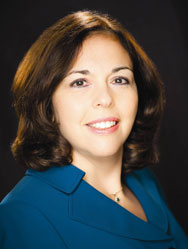
Andrea M. Russo, MD
Director, Cardiac
Electrophysiology and
Arrhythmia Services
Atrial Fibrillation (AFib) is the most common type of heart rhythm disorder, also known as a heart arrhythmia. The pumping of the heart is controlled by the heart’s electrical system. During AFib, the electrical signals in the upper chambers of the heart become disorganized, causing a rapid and irregular heartbeat. This can worsen the overall function of the heart, increase the risk of blood clots and stroke, and can ultimately lead to heart failure (or fluid buildup in the lungs). In fact, the average person with AFib is five times more likely to suffer from a stroke.
According to the American Heart Association (AHA), more than 2.7 million people in the United States have been diagnosed with AFib, and only 33 percent consider the condition to be serious. The AHA also estimates as many as 6.1 million Americans are living with AFib and have gone undiagnosed since the symptoms are not always obvious.
Treating a heart rhythm disorder requires absolute precision. At the Cooper Heart Rhythm Center, a program of the Cooper Heart Institute, patients have access to the most advanced technology and experienced electrophysiologists (a doctor who specializes in the diagnosis and treatment of abnormal heart rhythms) in southern New Jersey. “We deliver state-of-the-art arrhythmia treatment and patient-centered care through a team-based approach,” says Andrea M. Russo, MD, Director, Electrophysiology and Arrhythmia Services. “Our involvement in clinical research at Cooper provides access to the latest technology for care of our patients with arrhythmia disorders.”
The goal of treating AFib is to restore a normal heart rhythm and prevent blood clots from forming to reduce future risk of a stroke. The treatment that is chosen depends on the frequency and severity of the patient’s symptoms and risk factors for stroke, in addition to whether or not the patient was already been diagnosed with heart disease.
Risk Factors for AFib
- Age (higher risk with increased age, but can also occur in younger people)
- Obesity
- High blood pressure
- Underlying heart disease – coronary artery disease, prior heart attack, and heart failure
- Excessive alcohol use
- Family history
- Sleep apnea
- Other chronic conditions such as thyroid problems, diabetes, and asthma
Symptoms of AFib
If you experience any of the following symptoms, be sure to discuss them with your primary care physician:
- Heart palpitations (sudden pounding, fluttering or racing feeling in the chest)
- General fatigue and lack of energy
- Shortness of breath
- Dizziness, faintness
- Chest pain, pressure, or tightness
Treatment Options for AFib at Cooper
- Blood-thinning Medication to Prevent Blood Clots – Warfarin and other FDA-approved anticoagulants such as dabigitran, rivaroxaban, edoxaban, and apixaban.
- Medication to Control Heart Rate or Reset Rhythm – Anti-arrhythmic agents, calcium channel blockers, and beta blockers.
- Electrical Cardioversion – An electrical shock on the outside of the chest using either paddles or patches while under short-acting anesthesia.
- Catheter Ablation – A minimally invasive procedure in which heat energy is delivered to small areas of heart tissue that are responsible for creating abnormal electrical impulses that cause AFib, rendering them unable to send abnormal signals.
- Open-Heart Maze Procedure – Performed by a cardiothoracic surgeon, who creates small cuts in the upper part of the heart, the cuts are stitched together and scar tissue forms, interfering with electrical signals that cause AFib.
- Watchman FLX™ – Left Atrial Appendage occlusion device – a new, non-surgical stroke risk reduction option for patients with non-valvular AFib who want an alternative to long-term warfarin therapy.
- Pacemaker – A small electrical device implanted in the body under the skin near the collarbone that sends out an electrical signal to the heart to keep a steady rhythm; “leadless” pacemakers are also now available and are inserted through a vein in the groin to the heart to regulate the heart.
You can view and download this article in the Winter 2018 issue of Health Connection by clicking here. This article is on page 3.
For more information or to schedule an appointment with a Cooper Heart Institute cardiologist, call 1.800.8.COOPER (1.800.826.6737), or visit CooperHealth.org/Heart.
